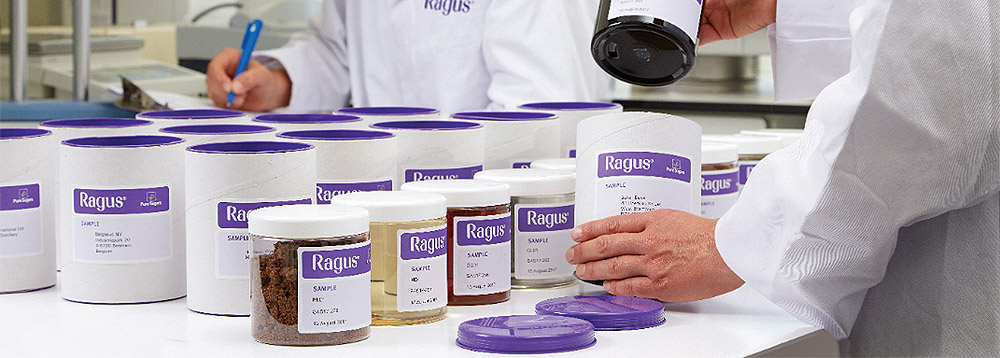
Ragus Pure Sugars
The sweetest thing
Using only certified sourced raw materials, Ragus develops customised pure sugar formulations for major food, drink and pharmaceutical companies around the world
It is broadly accepted that the first refined sugar appeared in India, approximately 2500 years ago, with the technique soon spreading east towards China, and west towards Persia. It would ultimately reach the Mediterranean in the 13th Century, with Madeira becoming the first place to cultivate sugarcane for large-scale refinement and trade during the late 15th Century. In the decades that followed sugarcane plantations became established in South America and the Caribbean, fuelling the demand for sugar in Western Europe. By 1750, there were 120 sugar refineries operating in Britain alone, producing a combined output of 30,000 tonnes per annum. Fast forward to today and sugarcane is the world’s third most valuable crop, after cereals and rice, and occupies close to 27 million hectares of land across the planet.
Established in 1928, Ragus traces its own heritage back to 1880, when brothers John and Charles Eastick opened a sugar analysis and consulting practice in the centre of London. Charles’ enthusiasm led him to begin experimenting with the by-products of the sugar refining process, an enterprise that led to the formulation of Golden Syrup as well as a number of specialist sugars and fruit-based goods. This was the work that led to creation of the business that exists to this day, a full-service global operation supplying hundreds of tonnes of pure sugar products to customers every day.
“Ragus is a leading UK importer and manufacturer of pure sugars and syrups, occupying a unique and knowledgeable position within the sugar market thanks to a heritage that is almost unrivalled, combined with passion and a dedication to a single product that is the gold standard in sweetening, and that is pure sugar,” explains Ragus’ Director, Ben Eastick.
Using highly efficient processes and smart technology, Ragus is able to deliver its pure sugars and specialist blends on time and in full to its customers, which include artisan bakers, brewers and a host of well-known blue chip global brands that have sugar products at the heart of their individual offerings. “The applied expertise of our team helps to produce a diverse range of products, with variations of texture, colour and taste for baking, brewing, confectionery and pharmaceutical applications,” Ben continues. “The raw materials that go into said products are all sourced from certified suppliers, with cane sugar originating from African, Caribbean, South Asia and Pacific countries, and beet sugar from within the European Union.”
Unique skills
The creation of Ragus’ sugars and syrups is supported by manufacturing processes that are certified to BRC and ISO 9001 standards, while all incoming materials and finished products are tested using the highest forms of industry standard equipment. Samples are then kept for a minimum of 18 months to allow for full traceability.
This equipment is concentrated within the company’s UK sugar manufacturing facility in Berkshire, which it moved into in 2012. “Our bespoke factory produces highly specialised pure sugar products for mainly industrial use,” Ben states. “What we do is source specific sugars to match our customers exacting requirements, which is a unique skill to possess within our industry. As such, our factory has been designed around these factors to produce batch processing. The move into this factory enables us to double our production over our previous plant through operational efficiencies, however the unprecedented demand we have seen for our crystalline sugars has meant that further investment is required to increase our capacity of these bespoke sugars.”
Efficient operations
One of the world’s most advanced sugar manufacturing sites, the machinery therein has been custom-engineered to help it achieve its goal of cutting carbon emissions year-on-year, while specially tailored technology and processes help it to reduce water consumption in sugar manufacturing, as well as enhancing production and packaging efficiencies.
These latter traits form part of a company-wide CSR strategy that incorporates eight key pillars that are embedded into Ragus’ vision and operations. The pillars cover health and safety, quality, employees, sustainability, supply chain, society and risk management. Each is unpinned by statutory requirements as well as added-value activities that help to demonstrate its commitment with actions. It is this approach to its activities that has seen Ragus achieve quality assurance and ethical standards accreditations from the likes of Sugarmark, the Organic Food Federation and Fairtrade, and it was one of the earliest members of BONSUCRO, the international, multi-stakeholder organisation established in 2008 to promote sustainable sugar cane.
One of the highlights for the company in 2017 was the abolition of European sugar beet quotas. This event marked the first time that producers have been freed from marketing limitations since 1968, and provides a platform for the industry to grow from in 2018. It is also during this calendar year that Ben and the rest of the Ragus team plan to ‘stick their heads above the parapet more’ to take advantage of sugar reforms, while also mounting a case for the benefits of using pure sugars, over alternative sweeteners.
It is the company’s stance that no other sweetener performs all of the combined functions of pure sugar, and replacing it means adding binding agents, colours and preservatives. The result is that the end product becomes less natural and more expensive to produce. The focus instead should be on either portion control or using different types of pure sugars to achieve better results. For example, the use of inverts, golden syrups and treacle in low-fat products can reduce total sugar content, as well as energy, labour costs and machinery requirements, over granulated sugar.
“Our long-term objective is to help to educate the food industry of the natural benefits of using our products over lesser alternatives,” Ben concludes. “We intend to do this against the backdrop of meeting increased demand for our goods by producing up to 50,000 tonnes of bespoke pure sugars and syrups per annum.”